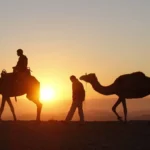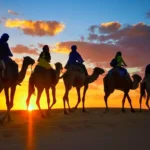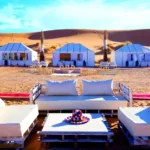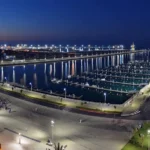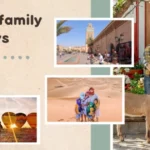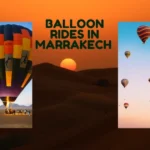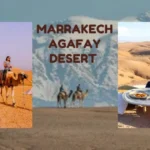Table of Contents
Imagine walking through the bustling souks of Marrakech as the evening call to prayer echoes across the city, while the air fills with the aromatic scents of harira soup and fresh chebakia pastries. This is Ramadan in Morocco, a time when the country transforms into a living tapestry of faith, tradition, and community spirit that offers travelers an unparalleled window into authentic Moroccan culture.
Embracing the Spirit of Ramadan in Morocco
What is Ramadan?
Ramadan is the ninth month of the Islamic lunar calendar, observed by Muslims worldwide as a time of fasting, prayer, reflection, and community. During this sacred month, practicing Muslims abstain from food, drink, smoking, and intimate relations from dawn until sunset, dedicating themselves to spiritual purification and empathy for those less fortunate.
Why Experience Ramadan in Morocco?
Visiting Morocco during Ramadan offers travelers a unique opportunity to witness one of the world’s most profound religious observances in a country where Islamic traditions have flourished for over a millennium. Morocco’s rich cultural heritage comes alive during this holy month, creating an atmosphere of heightened spirituality, generosity, and community bonding that’s impossible to experience at any other time.
The kingdom’s diverse landscapes, from the imperial cities of Fes and Meknes to the golden dunes of the Sahara Desert, provide an extraordinary backdrop for this spiritual journey. Whether you’re exploring the blue-painted streets of Chefchaouen or camping under the stars in Merzouga, Moroccan Ramadan traditions add depth and meaning to every travel experience.
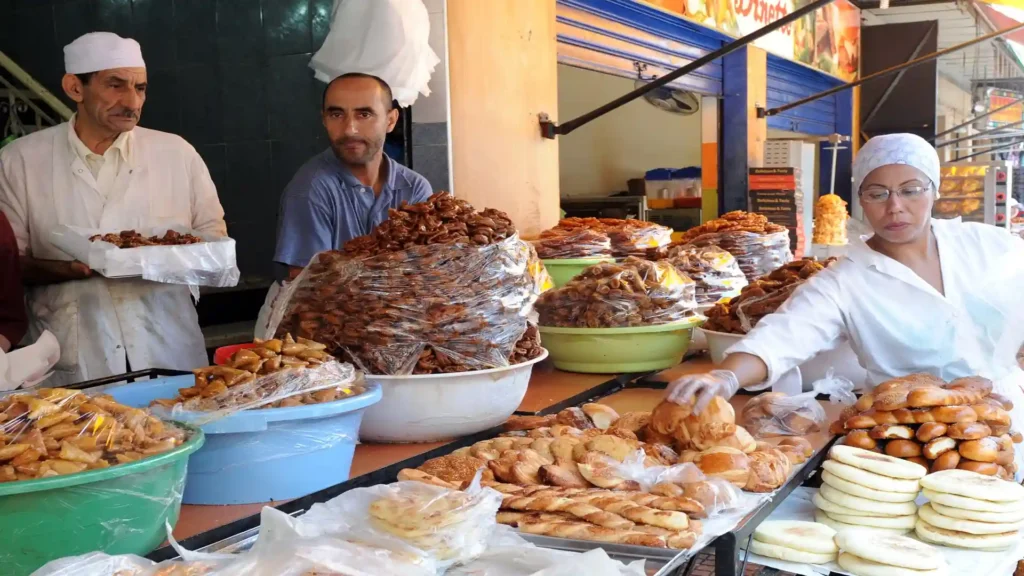
Travel Morocco Ramadan successfully by understanding that this is a time of:
- Spiritual reverence: Increased mosque attendance and prayer frequency
- Community solidarity: Families and strangers breaking fast together
- Cultural immersion: Traditional foods, music, and customs on full display
- Adjusted rhythms: Different business hours and social patterns
- Enhanced hospitality: Moroccans’ legendary warmth becomes even more pronounced
Ramadan Dates in Morocco: Planning Your Journey
Understanding Ramadan timing is crucial for travel Morocco Ramadan planning:
| Year | Approximate Start Date | Approximate End Date |
|---|---|---|
| 2024 | March 10 | April 9 |
| 2025 | February 28 | March 29 |
| 2026 | February 17 | March 18 |
Note: Islamic dates follow the lunar calendar, so exact dates are confirmed closer to the time based on moon sighting. Ramadan moves approximately 10-11 days earlier each year in the Gregorian calendar.
The Heart of Ramadan: Understanding Moroccan Traditions & Culture
Daily Rhythm & Observances
Moroccan culture Ramadan revolves around five key pillars that structure daily life during this holy month:
Fasting (Sawm): From dawn (Fajr) to sunset (Maghrib), observant Muslims abstain from all food and drink. This practice develops self-discipline, empathy, and spiritual awareness.
Prayer (Salat): While Muslims pray five times daily year-round, Ramadan intensifies this practice with additional evening prayers and increased mosque attendance.
Charity (Zakat): Giving to the less fortunate becomes especially prominent, with many Moroccans increasing their charitable activities during this month.
Quran Recitation: Many families dedicate time to reading and reflecting on Islamic holy texts, often gathering in the evening for communal study.
Pre-Dawn Meal (Suhoor/S’hour)
The day begins before dawn with Suhoor, a modest meal that sustains the faithful through their fast. Traditional Suhoor foods in Morocco include:
- Dates and milk: Following the Prophet Muhammad’s example
- Msemen or rghaif: Flaky pancakes with honey or jam
- Fresh fruits: Particularly oranges and seasonal produce
- Herbal teas: Mint tea or coffee for caffeine
- Yogurt and cheese: For protein and calcium
Families often wake together for this meal, creating intimate moments of connection before the day’s fast begins.
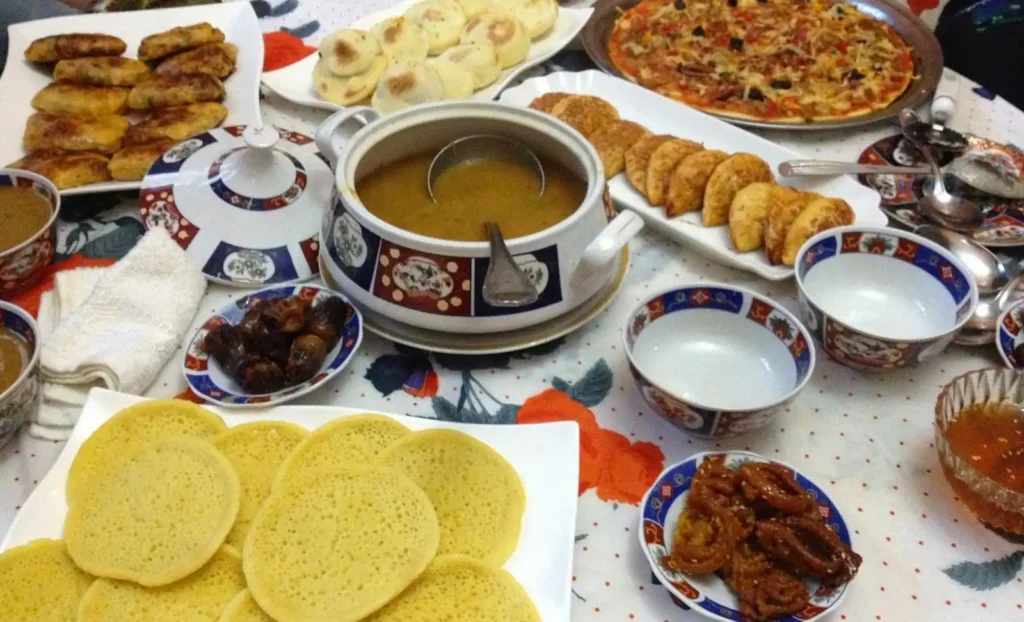
Breaking the Fast (Iftar/Ftour)
The evening Iftar is the day’s most anticipated moment. Ramadan food Morocco traditions center around this communal feast that begins precisely at sunset with the Maghrib call to prayer.
Traditional Iftar dishes include:
- Harira: Morocco’s beloved lentil and tomato soup, often considered the soul of Ramadan
- Chebakia: Flower-shaped sesame cookies glazed with honey
- Dates: Following Islamic tradition, the fast typically breaks with dates
- Sellou: A nutritious mixture of flour, almonds, and sesame seeds
- Fresh juices: Orange, avocado, or seasonal fruit blends
- Beghrir: Thousand-hole pancakes served with honey and butter
The beauty of Iftar lies not just in the food, but in the sense of community. Families gather, neighbors share meals, and even strangers are welcomed to join these sacred moments.
Night Prayers (Taraweeh)
After Iftar, many Moroccans attend Taraweeh prayers at local mosques. These special Ramadan prayers involve reciting portions of the Quran and can last 1-2 hours. The atmosphere is serene and contemplative, offering visitors a glimpse into Morocco’s deep spiritual traditions.
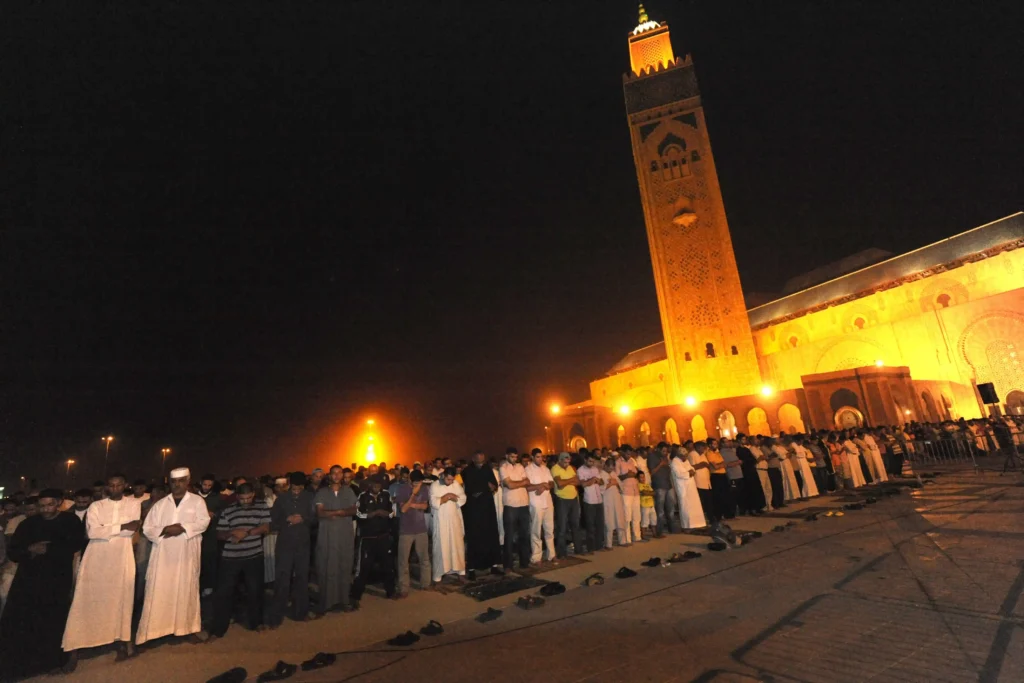
Laylat al-Qadr (Night of Power)
Occurring during the last ten days of Ramadan, Laylat al-Qadr is believed to be when the first verses of the Quran were revealed. Moroccans spend this night in intensive prayer and reflection, making it one of the most spiritually charged times to witness Moroccan Ramadan traditions.
Eid al-Fitr: The Celebration
Ramadan concludes with Eid al-Fitr, a joyous three-day celebration marked by:
- Special prayers at mosques
- Family gatherings and feasts
- Gift-giving, especially to children
- New clothes and decorations
- Community festivities and street celebrations
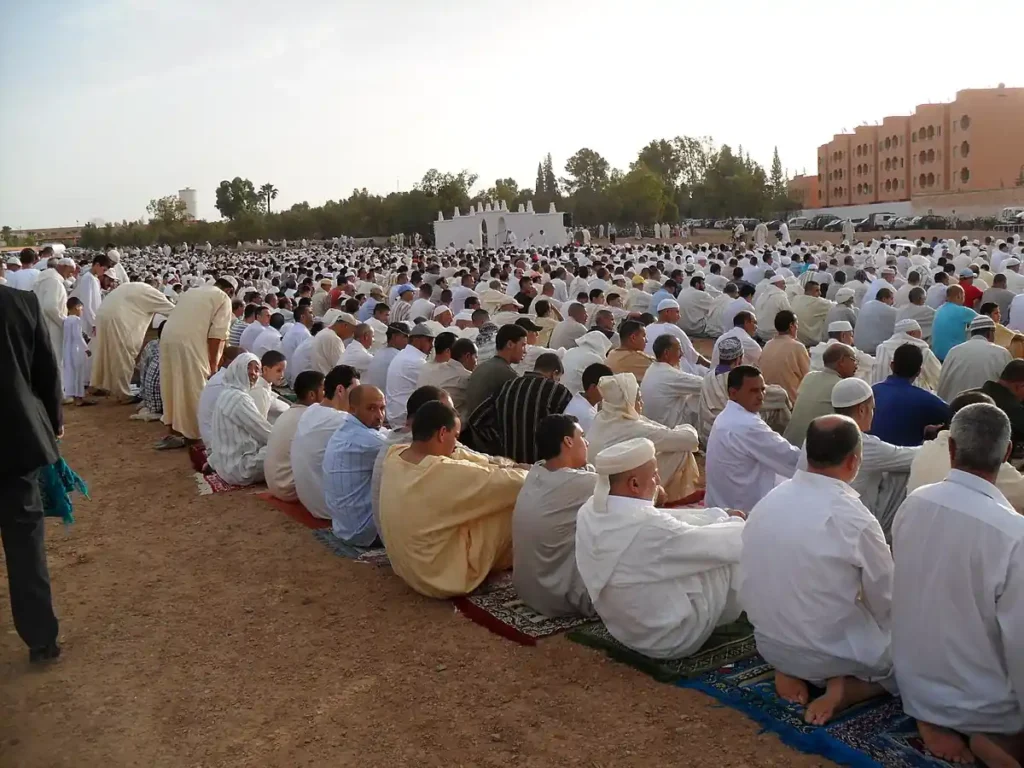
Navigating Morocco as a Traveler During Ramadan
What to Expect: Daily Life & Business Hours
Business Operations During Ramadan:
Shops and Markets (Souks): Most businesses operate reduced hours, typically opening late morning and closing before sunset, then reopening after Iftar until late evening. The post-Iftar hours (8 PM-midnight) are particularly vibrant for shopping.
Restaurants and Cafes: Many establishments close during daylight hours, though some remain open to serve non-Muslim travelers (usually with curtained sections). Hotel restaurants typically maintain normal service for guests.
Public Transportation: Bus and train schedules may be reduced, particularly during Iftar time. Plan accordingly and expect possible delays around prayer times.
Tourist Attractions: Most museums, historical sites, and attractions maintain regular hours, though guided tours might be adjusted to avoid fasting hours for local guides.
Food & Drink for Non-Fasters
Where and When You Can Eat:
- Hotel restaurants remain open for guests
- Some cafes in tourist areas serve with discretion
- Tourist districts often have options, though with limited visibility from the street
- Major cities generally offer more dining choices than rural areas
Special Ramadan Offerings: Many establishments create special Iftar menus for tourists wanting to experience traditional Ramadan food Morocco. These often include Harira soup, dates, and other authentic dishes.
Joining Local Iftar: Being invited to share Iftar with a Moroccan family is an extraordinary honor. If invited, dress modestly, bring flowers or pastries, and follow your host’s lead regarding customs and etiquette.
Alcohol & Nightlife
Alcohol availability becomes more limited during Ramadan, with many bars and nightclubs closing or operating with restricted hours. High-end hotels typically maintain service for international guests, though consumption should be discrete and respectful.
Accommodation: Hotels vs. Riads
Hotels: International chains usually maintain standard operations, offering regular meal service and amenities for non-Muslim guests.
Traditional Riads: Family-run riads might adjust their service patterns around Ramadan observances, but often provide unique opportunities to experience authentic Moroccan culture Ramadan through shared Iftar meals or cultural explanations.
Etiquette & Respect: How to Be a Gracious Visitor
Dress Code Guidelines
Modesty becomes even more important during Ramadan:
For Women:
- Long sleeves and pants/long skirts
- Covered shoulders and neckline
- Head covering when entering mosques
- Avoid tight or revealing clothing
For Men:
- Long pants (avoiding shorts in public)
- Shirts with sleeves
- Modest attire when visiting religious sites
Public Behavior Expectations
Eating and Drinking: Avoid eating, drinking, or smoking in public during daylight hours. While tourists aren’t expected to fast, showing respect by being discreet is appreciated.
Public Displays: Keep public displays of affection to a minimum, as conservative values are heightened during this religious period.
Noise Levels: Be mindful of noise, especially near mosques during prayer times or in residential areas where people might be resting.
Interacting with Locals
Appropriate Greetings: Learn phrases like “Ramadan Mubarak” (Blessed Ramadan) or “Ramadan Kareem” (Generous Ramadan) to show respect and cultural awareness.
Showing Understanding: Acknowledge that service might be slower and people may seem tired due to fasting. Patience and empathy go a long way.
Gift Giving: Small gifts of dates, flowers, or sweets are appropriate if invited to someone’s home for Iftar.
Photography Sensitivity
Be especially respectful when photographing during:
- Prayer times and religious ceremonies
- Iftar preparations and meals
- Inside or near mosques
- People engaged in religious observances
Always ask permission before photographing people, particularly during this sacred time.
Things to Do & Unique Experiences During Ramadan in Morocco
Experiencing the Iftar Atmosphere
Jemaa el-Fnaa, Marrakech: As the sun sets, this famous square transforms into a massive outdoor Iftar celebration. Food stalls appear with traditional Ramadan delicacies, creating an electric atmosphere of anticipation and community.
Local Restaurants: Many establishments offer special Iftar buffets featuring authentic Ramadan food Morocco. These communal dining experiences provide insight into traditional customs while satisfying culinary curiosity.
Evening Strolls and Night Markets
Post-Iftar, Morocco comes alive with renewed energy. Streets fill with families, friends, and shoppers enjoying the cool evening air. This is perfect timing for:
- Exploring Medina alleyways
- Shopping in souks with more relaxed bargaining
- Enjoying traditional music performances
- Witnessing spontaneous community gatherings
Pre-Eid Shopping Adventures
The weeks leading to Eid al-Fitr create fantastic shopping opportunities:
- Special Ramadan decorations and items
- Traditional clothing and fabrics
- Unique handicrafts and gifts
- Seasonal foods and sweets
Cooking Classes: Learning Ramadan Traditions
Many riads and cultural centers offer special Ramadan cooking classes, teaching travelers to prepare:
- Authentic Harira soup
- Traditional Chebakia cookies
- Msemen pancakes
- Seasonal Ramadan specialties
These hands-on experiences provide deep cultural understanding while creating practical skills and lasting memories.
Volunteer Opportunities
Some organizations welcome respectful international volunteers for:
- Food distribution to needy families
- Community Iftar preparations
- Educational programs for children
- Environmental or social projects
Always approach volunteer opportunities through established, reputable organizations with cultural sensitivity.
Unique Cultural Events
Different cities host special Ramadan programming:
- Fes: Traditional music concerts in historic venues
- Rabat: Cultural exhibitions celebrating Islamic art
- Casablanca: Modern interpretations of Ramadan traditions
- Marrakech: Special performances in riads and hotels
City-Specific Insights: Ramadan Across Morocco
Marrakech: Imperial Grandeur Meets Spiritual Devotion
Marrakech during Ramadan offers contrasts between ancient tradition and tourist accommodation. The medina pulses with spiritual energy while the Gueliz district maintains more conventional tourist services. Things to do Ramadan Morocco in Marrakech include experiencing Iftar at Jemaa el-Fnaa, visiting the tranquil Majorelle Gardens during quiet afternoon hours, and enjoying special Ramadan performances at traditional riads.
Fes: The Spiritual Heart of Morocco
As Morocco’s spiritual capital, Fes provides the most authentic Ramadan experience. The ancient medina becomes especially sacred during this time, with increased activity around Al-Karaouine University and surrounding mosques. The city’s traditional crafts and religious scholarship create an atmosphere of deep contemplation and learning.
Casablanca: Modern Morocco During Ramadan
Morocco’s economic capital blends contemporary life with Ramadan observance. The Hassan II Mosque becomes a focal point for large community prayers, while the city’s modern restaurants and hotels cater well to international visitors. Business districts adjust to Ramadan rhythms while maintaining essential services.
Chefchaouen: Mountain Serenity and Spiritual Peace
The blue city offers a more intimate Ramadan experience, with small community gatherings and stunning mountain vistas for quiet reflection. Evening strolls through blue-painted streets provide magical photo opportunities and peaceful moments away from larger city crowds.
Essaouira: Coastal Ramadan Charm
This Atlantic coastal city combines beach relaxation with Ramadan observance. Fresh seafood appears in traditional Iftar meals, while the medina’s artistic community creates unique cultural programming. Sea breezes and artistic ambiance make for memorable evening experiences.
Merzouga: Desert Spirituality Under the Stars
What to expect Ramadan Morocco in the Sahara includes profound spiritual experiences under endless starry skies. Desert camps adapt their services for Ramadan while offering unique opportunities to break fast surrounded by golden dunes. The silence and vastness of the desert create perfect conditions for reflection and spiritual connection.
Practical Tips for a Smooth Ramadan Trip
Booking and Reservations
Advanced Planning: Ramadan is a popular time for domestic travel, so book accommodations, transportation, and tours well in advance. Many Moroccans vacation during this period, especially during the final weeks.
Flexible Bookings: Choose accommodations and tours that offer flexibility, as schedules may need adjustment based on religious observances and local customs.
Embrace Patience and Flexibility
Slower Pace: Accept that everything moves more slowly during Ramadan. Service may take longer, and people might seem less energetic during fasting hours.
Schedule Adjustments: Plan major activities for morning hours or post-Iftar evening times when energy levels are higher.
Cultural Immersion: Use the adjusted pace as an opportunity to slow down and truly absorb Moroccan culture rather than rushing between attractions.
Essential Arabic Phrases
Learn these key phrases to show respect and enhance interactions:
- Ramadan Mubarak (Blessed Ramadan)
- Ramadan Kareem (Generous Ramadan)
- Shukran (Thank you)
- Barakallahu fik (May God bless you – response to thanks)
- Mabrouk (Congratulations – for Eid)
- Bismillah (In the name of God – said before eating)
Health and Hydration
Stay Hydrated: Even though locals are fasting, visitors should maintain proper hydration, especially when traveling in desert regions or during hot weather.
Medical Considerations: Carry any necessary medications and be aware that pharmacy hours might be adjusted during Ramadan.
Energy Management: Plan rest periods during the hottest parts of the day, particularly if engaging in active sightseeing or desert activities.
Safety Considerations
Reduced Emergency Services: Some services may operate with limited hours, so carry emergency contact information and know your nearest hospital or clinic.
Traffic Patterns: Roads can become extremely busy just before Iftar as people rush home, so plan transportation accordingly.
Cultural Sensitivity: Follow local customs strictly to avoid any cultural misunderstandings or offense.
Debunking Myths & Answering FAQs
“Is it dangerous to visit Morocco during Ramadan?”
Reality: Morocco remains as safe for tourists during Ramadan as at any other time. In fact, the increased focus on spiritual values often makes communities even more welcoming and peaceful. Crime rates typically decrease during this holy month.
“Will I starve as a tourist?”
Reality: While restaurant options may be limited during daylight hours, hotels, tourist areas, and many establishments cater specifically to international visitors. Planning ahead ensures you’ll always have access to food and drink.
“Is everything closed during Ramadan?”
Reality: Business hours adjust rather than disappear entirely. Most tourist attractions, museums, and essential services continue operating, though with modified schedules that respect local customs.
“Can I drink alcohol during Ramadan?”
Reality: While availability may be more limited, licensed establishments in hotels and tourist areas typically continue serving alcohol to international guests, though consumption should be discrete and respectful.
“Will tour guides and drivers be affected by fasting?”
Reality: Professional guides and drivers are accustomed to working during Ramadan and adjust their schedules accordingly. Many prefer morning tours or post-Iftar evening activities.
“Is it offensive for non-Muslims to eat in public?”
Reality: While discretion is appreciated, eating indoors or in designated tourist areas is generally acceptable. The key is showing respect rather than absolute adherence to fasting rules.
“Can I visit mosques during Ramadan?”
Reality: Many mosques welcome respectful non-Muslim visitors outside prayer times, though some may have restricted access during the holy month. Always dress modestly and follow local guidance.
“Will transportation be affected?”
Reality: Public transport continues operating with possible schedule adjustments around prayer times and Iftar. Private transfers and tours typically accommodate tourist needs while respecting local customs.
Conclusion: A Truly Authentic Moroccan Experience
Visiting Morocco during Ramadan offers travelers an extraordinary opportunity to witness one of the world’s most beautiful religious observances in a country where hospitality and cultural richness create unforgettable memories. Far from being a hindrance to travel, Ramadan enhances the Moroccan experience by providing deeper cultural insights, meaningful local connections, and authentic traditions that most tourists never experience.
The slower pace allows for genuine appreciation of Morocco’s architectural wonders, from the intricate mosaics of Fes to the kasbahs of the Atlas Mountains. The communal spirit opens doors to authentic interactions with locals who are often even more generous and welcoming during this sacred time. The evening energy after Iftar reveals a different side of Moroccan cities, filled with joy, community, and celebration.
Moroccan Ramadan traditions teach valuable lessons about patience, gratitude, and community that resonate long after returning home. Whether you’re sharing Harira soup with a local family, watching the sunset from the Sahara dunes during breaking of fast, or exploring the illuminated souks in post-Iftar excitement, these experiences create profound travel memories.
For travelers seeking authentic cultural immersion, spiritual reflection, and meaningful connections with local communities, there’s no better time to explore Morocco than during Ramadan. The kingdom’s legendary hospitality, combined with the heightened spirituality of this holy month, creates a travel experience that transforms both perspective and heart.
Ready to Plan Your Ramadan Journey to Morocco?
Contact Desert Merzouga Tours to create a customized itinerary that respects local customs while providing extraordinary cultural experiences. Our expert guides and carefully planned accommodations ensure your Ramadan journey through Morocco becomes a treasured memory of spiritual discovery and cultural understanding.
Share your own experiences of Ramadan in Morocco with fellow travelers, and help others discover the profound beauty of this sacred time in one of the world’s most culturally rich destinations.

